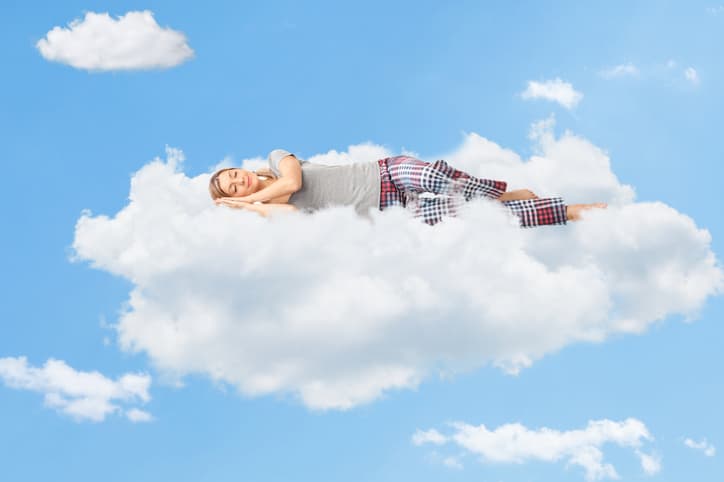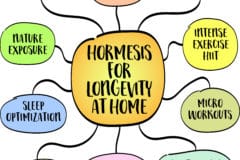By “hacking” your sleep – that is, following proven tips to optimize both the quality and duration of your sleep – you can set yourself up for a successful, productive day.
Impacts of Insufficient Sleep
If having a successful day is not the motivator you need, consider that consistent inadequate sleep is strongly associated with high blood pressure, diabetes, heart attack, heart failure, and stroke. Other potential problems include obesity, depression, impairment in immunity and lower sex drive.
For those in their 50s and 60s, the NIH recently concluded a study which indicated that getting six or less hours of sleep per night was linked to developing dementia.
So, whether you’re interested in optimizing your day, or you just care about your health…
Consider the following sleep hacking tips for getting a good night’s rest:
- Increase bright light exposure during the day. Living in alignment to the circadian cycle helps your body’s hormones. Daytime bright light exposure can improve sleep quality and duration. Spending 30-45 minutes getting direct sunlight exposure into your eyes (note: exposure, not staring at the sun!) within the first hour after waking is best. If getting daily sunlight exposure is not practical, consider investing in artificial light boxes for your workspace.
- Reduce blue light exposure in the evening. Translation: Have a “digital sunset” and do your best to not look at blue light emitting devices like smartphones and computers. Reason: Blue light tricks your body’s hormones into thinking it’s daytime and reduces melatonin levels. If staying away from blue light feels unrealistic, consider blue light blocking glasses (or blue light lens that clip onto your prescription glasses) and/or downloading free apps such as f.lux to block blue light on your laptop/computer.
- Drink your coffee, strategically. The best time to drink coffee is mid- to late-morning when cortisol levels are lower. Upon waking, your cortisol spikes (telling body: time to start the day!) but it dips back down after 2-4hrs of being awake (i.e. between 9:30-11:30am for most people). Aim to drink your coffee during this trough and to be finished at least 6hrs before bed (caffeine can stay elevated in blood for 6-8hrs).
- Avoid alcohol at night. Alcohol is a central nervous system depressant that can induce relaxation and sleepiness. While it may help you fall asleep it severely impacts the quality of your sleep due to it’s affects on your melatonin and human growth hormone production. In one 2018 study, low alcohol consumption (< 1 drink for women, < 2 drinks for men) decreased sleep quality by 9.3%. Moderate consumption (1 drink for women, 2 drinks for men) decreased sleep quality by 24%. High alcohol consumption (>1 drink for women, >2 drinks for men) decreased sleep quality by 39.2%.
- Optimize your bedroom environment. Minimize external noise, light, and artificial light from devices like alarm clocks. Sleep in a comfortble temperature, for many people this is around 70°F or lower as increased body/room temperature can increase wakefulness.
- Don’t eat late in the evening. Consuming food late at night may affect sleep quality and the natural release of HGH and melatonin. Aim to finish eating (including snacks) at least 2hrs before bed.
- Relax, clear your mind. Whether it’s reading a book, taking a bath, or doing guided breathwork/meditation/visualization exercises, the goal is to calm the body and prepare for sleep. Apps such as Headspace, Calm, and even Peloton have sleep-specific meditations (but wear your blue light blockers if using your phone/tablet/computer!).
- Rule out a sleep disorder. It’s thought that 24% of men, 9% of women, and 3% of children may have sleep apnea. Signs include snoring, mouth breathing, breathing pauses during sleep, and daytime sleepiness. If you think you may have sleep apnea, discuss this with your doctor, functional dentist, or a sleep specialist that can recommend a sleep study or polysomnogram to diagnose it.
- Mouth tape. Say what? This may sound bizarre but many of us breathe through our mouths when we sleep, and the health benefits of nose breathing are undeniable. Mouth taping increases nitric oxide intake (which is produced in the sinuses), reduces teeth grinding, and reduces dry mouth (which is harmful to your oral microbiome & dental health). There are specific types of tape for mouth taping however you can also use medical grade (sensitive) tape which is more affordable.
By making some of these small, yet intentional sleep hacking decisions over the course of our day we can optimize our sleep and improve our lives.
Reminder: Gents – the inaugural Wisemen Experience men’s health retreat still has room available. Consider joining if interested in applying ancient/science-based wellness modalities to improve your life as a partner, parent, professional… and beyond.






